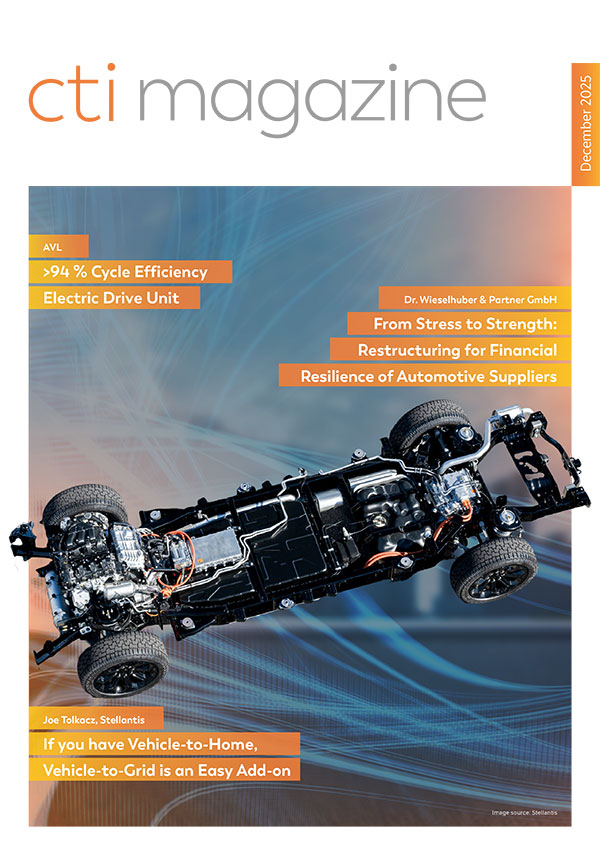
How do you make e-mobility more affordable? At the CTI Symposium Berlin in December 2023, we caught up with Thorsten Jablonski, Head of Development & Product Management Volkswagen Group Components. As he sees it, there are several levers: for example battery technology, electric drives, and leaner processes in development and production.
On the product side, what key levers can make BEVs affordable for people who find them too expensive?
The biggest cost driver for electric cars is still the battery. Fast charging tech costs money, and so does battery capacity. Volkswagen has to focus on customers’ priorities. Is this a second vehicle that you can charge slowly at home, but which has a high range? Or are 200 kilometers of range enough? Another big cost factor is cell chemistry. With electric powertrains, it’s all about simplification. With electric drives, you can dial some of the requirements down a bit, for example how quickly the interior heats up. So it’s simplification and the battery system. For me, those are the two levers for building an electric car in an affordable price range.
What are you doing in the field of batteries?
Volkswagen develops and produces its own battery systems, and also assembles them. It started with the E-Golf and also the systems for the E-Up were produced in-house. The only components which were bought are the battery cells and the modules. In the future, the modules will gradually disappear and the cells will increasingly migrate into the vehicle. Today Volkswagen also develops the battery management software and battery system in-house and assembles them at its own factories, sometimes via third-party manufacturers. But the development is always 100 percent Volkswagen.
Depending on the brand and segment, you might also want to scale the electric drives. How do you reduce variance there?
In electromobility, performance doesn’t have to be expensive. The cost difference between 100 and 400 kW doesn’t have to be that big. The key is a concept for scaling performance neatly, in a modular system. That means all drives can be manufactured on the same production lines. It takes a lot of brainpower to avoid compromising on the costs of drives, which need to be affordable. The modular system achieves best-in-class scores in many areas. All that calls for a lot of discipline, and a great deal of engineering skill. Charging options are the make-or-break factor for BEV acceptance.
What is Volkswagen doing to improve public charging infrastructures?
Within the Group, the Elli brand is responsible specifically for this purpose. With Elli we are offering one of the the largest charging networks in Europe and are giving access to more than 620,000 charging points. And through Electrify America Volkswagen has built up the most powerful open hyper-fast charging network in the United States and Canada. Another factor with range is thermal management.
How can that be made more efficient?
If you look at the total number of hoses in there today, it’s enormous. It`s called the ‘snake pit’. All those connecting hoses will disappear in the future; everything will be combined in a single module. You can even replace hardware with software. That improves your cost efficiency, and also your energy efficiency. But you have to think holistically, throughout the whole electric powertrain. That’s one key reason why we focus on the entire powertrain.
Which areas will Volkswagen withdraw from, in favor of electric drives?
Everything about electric powertrains will be kept, including the chassis that were designed for them. But components that are costly and not sustainable will be skipped. For example, the development and production of shock absorbers. What will remain apart from BEVs? In China, P1/P3-xHEVs are still selling.
Do you see any future in Europe for solutions like these?
Often markets depend on legislation. In China, plug-in hybrids grew their market share from one or two to thirty percent. Some Chinese manufacturers decided to back PHEVs – and then they got subsidized. If Volkswagen starts selling systems like that now in China, I believe that those incentives will soon be scrapped. As for Europe or Germany, if biofuels are not accepted as sustainable and there is no funding, plug-in hybrids will not gain a huge market share. Germany and Europe are concentrating on electric cars now because they want to get one technology established first.
Interview: Gernot Goppelt
